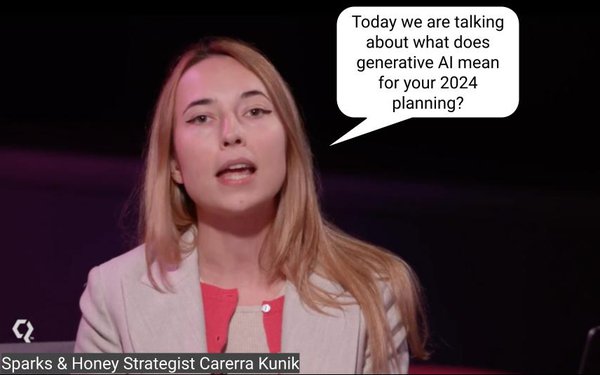
Late last year, Sparks & Honey conducted a series of
culture briefings to help the ad industry prepare for the impact AI would have on their businesses in 2024. Following news that Omnicom is effectively shutting the company down and folding its
proprietary "Q" AI platform into Omnicom's, some might wonder whether Sparks & Honey ironically helped engineer its own demise.
Or put another way, is Sparks & Honey the first
metaphorical canary in the coal mine of an even bigger wave of organizational disruption poised to happen across the ad world as new generations of AI work faster, smarter and more economically than
Mad Men and Women can?
To date, Omnicom has been among the most aggressive of the major holding companies in both underwriting the development of AI technology and integrating it across its
systems and workforces, engineering constantly updating versions of its own homegrown OMNI AI-powered operating system, which in the past couple of years began formally integrating with S&H's
Q.
advertisement
advertisement
During quarterly earnings calls with analysts, CEO John Wren has been predicting AI would transform the ad industry fundamentally, and that Omnicom's early stakes in the ground have given
it a competitive advantage over other holding cos. But for the most part, he did not address how it was or would impact Omnicom's massive workfroce.
Omnicom Digital CEO Jonathan Nelson, who
brought S&H into Omnicom's portfolio and has also been the chief architect behind OMNI, its integration with Q, as well as big deals with the major outside, third-party AI developers, has
routinely maintained that AI would not displace people, but would give them "super powers" and would create new, better jobs for agency people.
And it is clear from some recent developments --
including Omnicom Media Group's (OMG) "Commitment Optimizer" pilot with Google,
which will remove much of the spreadsheet drudgery from rank-and-file planners and buyers allocating and reallocating budgets and inventory -- that that may indeed be the case.
Still, one
can't help wondering if S&H built too good a machine in Q, which has the ability to scrape, analyze, organize and distill into meaning millions of cultural signals that might take human analysts
days, if not weeks to distill.
In S&H's model, the humans would simply be leveraging Q's super powers to ask, think about, re-ask, and apply better questions about cultural trends, and
then using it as the basis to consult and advise big advertising clients the old fashioned way: human to human.
In fact, that was already well in place and working quiet well, according to
agency insiders, and the S&H and OMG teams already were jointly selling co-branded services to clients and were on their way to becoming fully integrated -- effectively moving S&H from
Omnicom's Precision Marketing Group into OMG when the decision to close S&H as a free-standing unit suddenly got made in recent weeks.
Insiders say Omnicom will retain the S&H brand,
its intellectual property, including S&H's proprietary elements of culture methodology, and will integrate a small, core group of S&Hers into OMG, while some of its Q tech team will move into
OMG's Annalect group, which is responsible for developing and updating OMNI.
Clearly, that makes good, economic sense for Omnicom corporately, but what about all that human ingenuity that
helped develop the methods and technology in the first place? And what about all the people advising and consulting all those clients?
It's hard to say whether the move was just bottom line
decision-making, or a bellwether for greater industry change.
But ironically, just as Omnicom pulls back on S&H's culture practice, at least one of its peer competitors -- IPG's Huge -- is expanding into that market with its own AI-enabled IP. At least for
now.
11-2
| What Does Generative AI Mean for Your 2024 Planning from sparks & honey on Vimeo.